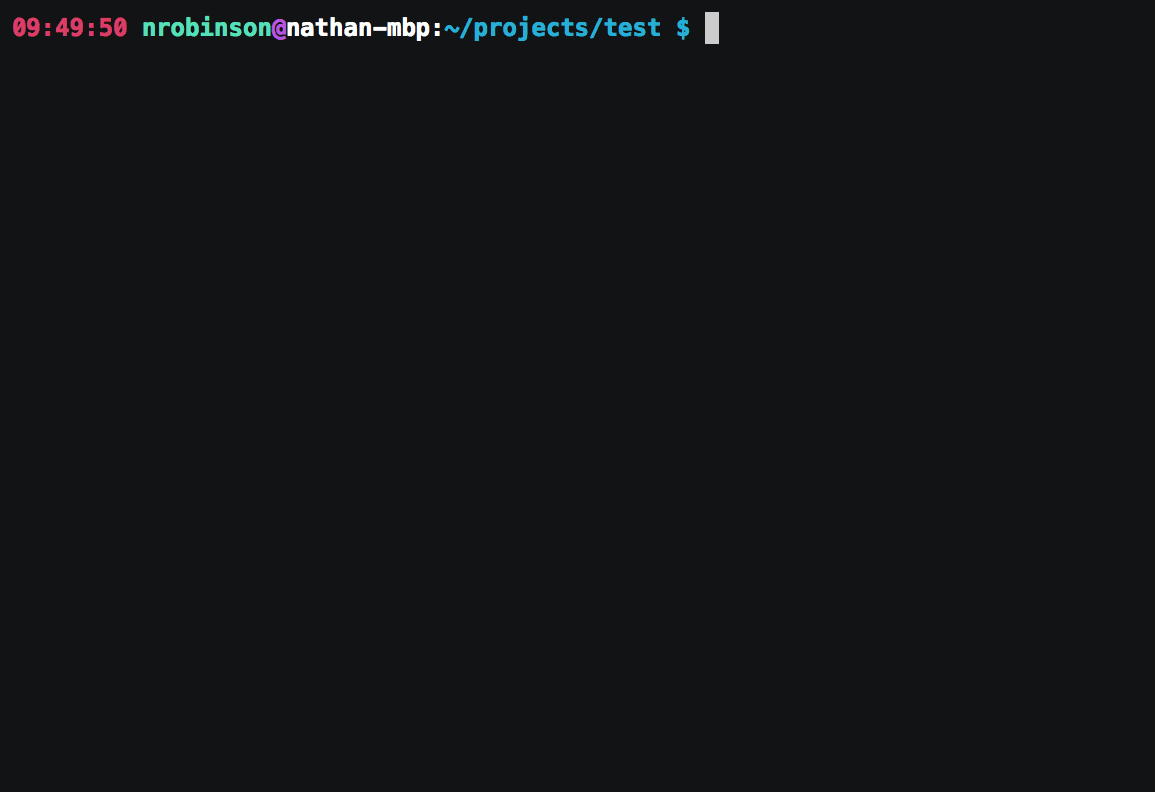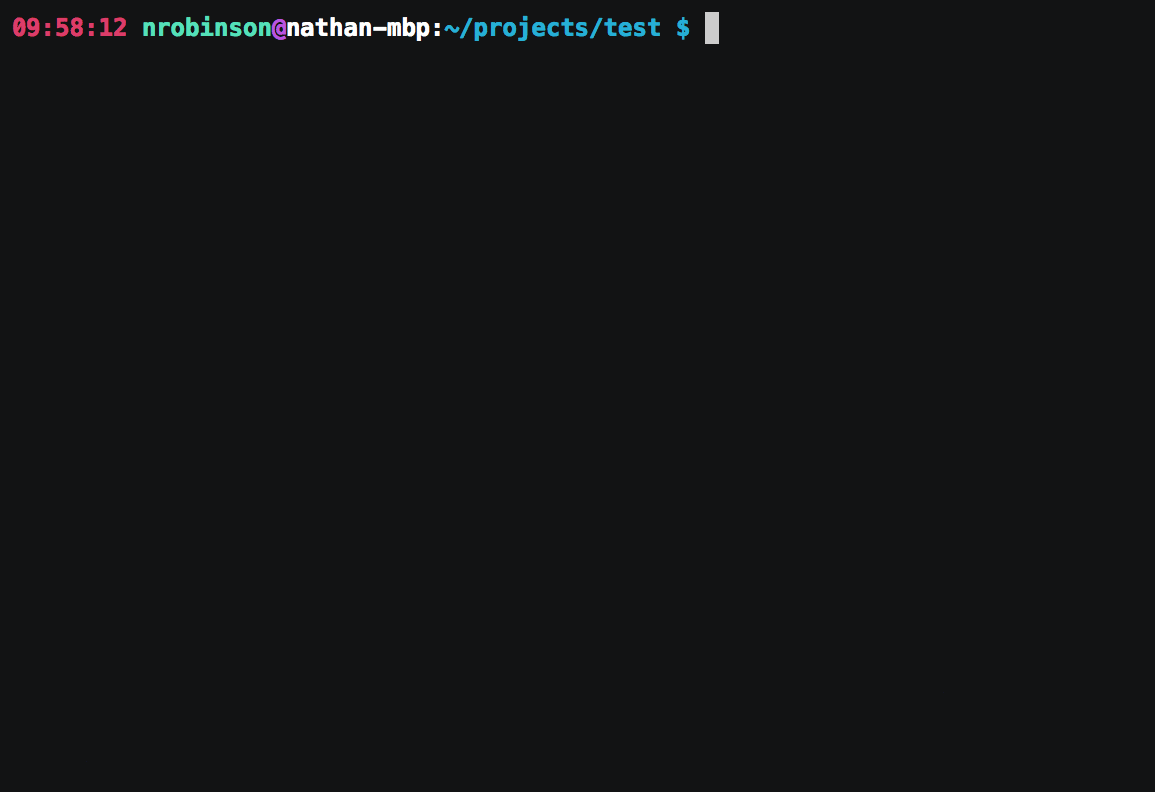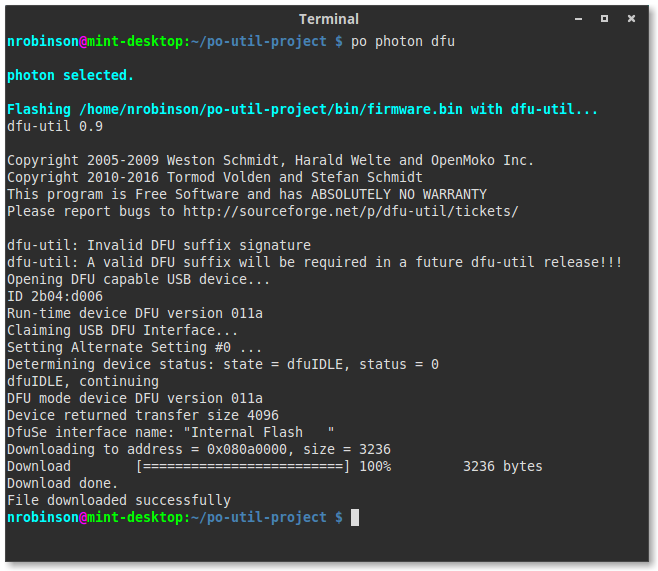Home - nrobinson2000/po-util GitHub Wiki
Particle Offline Utility, pronounced po-util, is a tool for installing and
using the Particle Toolchain on Linux and macOS.
po-util makes it easy for developers to download the Particle Toolchain and install the required dependencies to quickly begin creating projects using the Particle Platform.
po-util features a responsive experience, giving developers the tools they
need for seamless local development, providing understandable commands for
simplifying complex tasks like properly compiling and flashing firmware.

There are two versions of po-util. The first is po-util Classic, which is designed for Linux distributions. The second is po-util Homebrew Edition, which is designed for macOS. Classic can be installed by following the instructions below:
The most secure way to install po-util is to download po-util.sh directly and run it:
$ curl -fsSLO https://raw.githubusercontent.com/nrobinson2000/po-util/master/po-util.sh
$ chmod +x po-util.sh ; ./po-util.sh install
A quickest and easiest way to install po-util is to run this command:
$ bash <( curl -sL https://raw.githubusercontent.com/nrobinson2000/po-util/master/po-util.sh ) install
You can also install po-util by cloning the GitHub repository:
$ git clone https://github.com/nrobinson2000/po-util
$ cd po-util
$ ./po-util.sh install
On macOS, Homebrew Edition can be installed by running these commands:
$ brew tap nrobinson2000/po
$ brew install po
$ po install
Note: Both versions of po-util have the same features. In December 2016, Homebrew Edition was forked from po-util in order to allow po-util to be installed with Homebrew. The original po-util was renamed to Classic, and was made Linux exclusive. Both Classic and Homebrew Edition continue to be developed and maintained in parallel.

The library manager makes it easy to use Particle libraries when developing
with po-util locally by using git to download Particle libraries hosted on
GitHub and save them to a ~/.po-util/lib directory so that they make be linked
inside of projects later. Read more about the Library Manager here.

po-util installs all of the dependencies required for local Particle
Development, including the ARM toolchain, dfu-util,
nodejs, particle-cli and the Particle firmware.
Building firmware locally for Electrons, Photons and P1s, and automatically flashing over USB using dfu-util or Over The Air using particle-cli. Sequentially flashing multiple devices at once over the air is also supported.
po-util supports shortcuts for Atom, the popular open-
source IDE by GitHub. The shourcuts provide quick access to commonly used
commands for po-util, including: building firmware, flashing firmware over
USB, and flashing firmware Over The Air. Read more about the shortcuts
here.

The directory structure of a full po-util project is arranged like so:
firmware/
├ main.cpp
└ lib1/
├ lib1.cpp
├ lib1.h
└ ...
bin/
├ firmware.bin
└ ...
ci/
devices.txt
libs.txt
.atom-build.yml
.travis.yml
.gitignore
.git/
README.md
- All user code is kept inside of
firmware/. - The compiled binary will be named
firmware.bin, and it will be inbin/. - You can keep track of which devices are in a project and list which ones to be flashed Over The Air in
devices.txt. - Libraries are kept track of in
libs.txt. - Atom shortcuts are configured in
.atom-build.yml. - Every
po-utilproject is initialized as a repository with scripts inci/to use Travis CI for testing.
When using po-util, your code is arranged into projects with the structure
described above. This not only lets you easily work on many projects on one
computer, but it provides a standardized way of building locally.
Creating a project with po-util is simple when you use po init to initialize a project by creating the necessary files. Below is an example:
$ po init DEVICE_TYPE someProject
You can set DEVICE_TYPE to either photon, P1, electron, core, pi, or duo. This is
necessary for generating the Atom shortcuts file appropriately.
Here is some more information about using po-util.
po-util compiles any .cpp and .h files found in the firmware/
directory, but not .ino files, so #include "Particle.h" must be present
in your main.cpp file. This is done for you when you run the po init
command to create a project directory.
To compile firmware, simply run po DEVICE_TYPE build, substituting DEVICE_TYPE for
photon, P1, or electron. To compile and flash firmware to your device
using dfu-util, simply run po DEVICE_TYPE flash. To clean the project, run po DEVICE_TYPE clean.

To upload precompiled code over USB, run po DEVICE_TYPE dfu. To put your device
into dfu mode, run po dfu-open. To get your device out of dfu mode, run po dfu-close.

To upload precompiled code over the air using particle-cli, run po DEVICE_TYPE ota DEVICE_NAME, where DEVICE_NAME is the name of your device in the Particle
cloud. You must be logged into particle-cli to use this feature. You can log
into particle-cli with particle cloud login.
You can also flash code to multiple devices at once by passing the -m or
--multi argument to ota. This would look like po DEVICE_TYPE ota -m. This
relies on a file called devices.txt that you must create in your po-util
project directory.
NOTE: This is different from the product firmware update feature in the Particle Console because it updates the firmware of devices one at a time and only if the devices are online when the command is run.

"I think you identified a common pain point for a lot of users, and the automated installation of the Particle toolchain is a problem that we've been focused on a lot recently ... you should already feel proud of yourself because you have made a meaningful contribution to the community. We are all very thankful for it - our community regularly impresses us, and you are certainly not an exception."
"It has been nearly flawless and a HUGE productivity booster... I cannot believe your steps worked installing so many utils and dependencies perfectly... The Particle world owes you a big debt. If there were Emmy awards for Particle contribs, you would get one."
"Nice! This is great stuff. Definitely helpful for the local dev / offline use case. Thanks for sharing."
"Thanks a lot for this amazing tool. I finally managed to get everything as I wanted: to be able to work off-line."
"Po-util is a very handy script - thanks for sharing."
"I can't heart this enough!"




